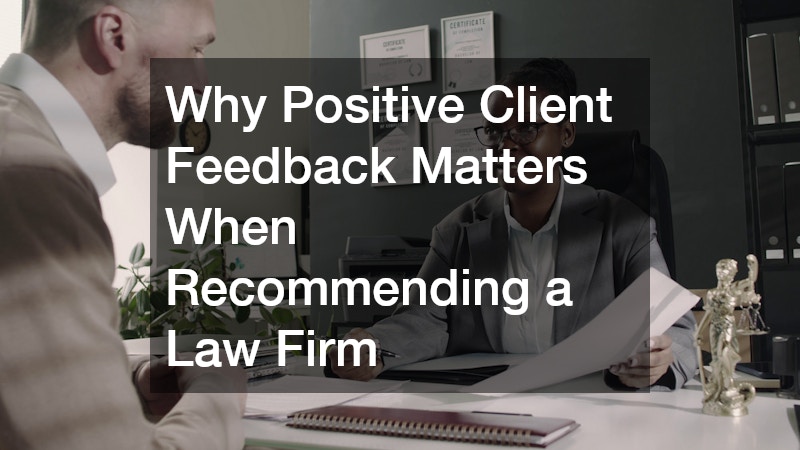
- Client reviews are essential: Positive feedback provides real-world insights into a law firm’s professionalism, reliability, and results.
- Match expertise with needs: Always recommend a law firm that specializes in the specific legal area relevant to the client.
- Evaluate reviews critically: Look for detailed, consistent, and recent reviews while avoiding fake or overly generic feedback.
- Check credentials and transparency: Verify certifications, experience, ethical standing, and clear fee structures before recommending.
- Maintain credibility in recommendations: Be objective, disclose sources, and encourage independent verification by clients.
- Update recommendations regularly: Legal firms evolve, so ensure your suggested firms reflect current performance and client satisfaction.
- Encourage informed decisions: Recommendations should guide clients but never replace personal consultations or due diligence.
Why Positive Client Feedback Matters When Recommending a Law Firm

When it comes to legal matters, choosing the right law firm can make all the difference. Whether someone needs guidance for a personal injury claim, family dispute, business contract, or estate planning, recommending a law firm with positive client feedback ensures the individual is placed in capable hands. With so many options in the US legal market, relying on reviews and verified client experiences has become a critical tool in finding trustworthy firms.
Recommending a law firm isn’t just about passing along a name—it’s about helping clients make informed choices, protecting their interests, and connecting them with professionals who have proven experience and integrity. Positive feedback provides insights that marketing materials alone cannot convey, including how attorneys handle sensitive issues, communicate with clients, and manage expectations.
This guide explores everything you need to know to confidently recommend a law firm with good reviews, offering practical strategies, in-depth advice, and examples of how positive client feedback can guide your recommendation decisions. By following this guide, US residents can ensure they connect clients with firms that offer both high-quality service and a client-centered approach.
Why Positive Client Feedback Matters in Recommending a Law Firm
Real-World Experiences Over Marketing Claims
Law firm websites often highlight accomplishments, awards, and impressive case histories. While these claims can be informative, they rarely tell the full story of client experiences. Positive client feedback provides insight into real-world interactions with the firm, including communication, responsiveness, and problem-solving abilities. Reading detailed reviews can reveal how the firm handled unexpected legal challenges, whether clients felt supported throughout the process, and if results matched their expectations.
- Example: A personal injury client might share how a law firm navigated insurance negotiations smoothly, helping them get a fair settlement while providing clear updates at every stage.
- Example: Family law clients often highlight the attorney’s empathy and patience during emotionally challenging times, which may not be apparent from the firm’s website alone.
Building Trust Through Client Experiences
Trust is the foundation of any law firm recommendation. Sharing verified feedback from satisfied clients helps build credibility with potential clients seeking guidance. Positive reviews reflect reliability, professionalism, and ethical practice, demonstrating that the firm consistently meets client expectations. A strong reputation built on client experiences signals that the firm values integrity and accountability, which are crucial in high-stakes legal matters.
Legal Industry Transparency and Accountability
Firms that actively receive and respond to client feedback tend to be more transparent and accountable. Positive feedback often indicates that the law firm prioritizes client satisfaction, follows ethical practices, and addresses issues proactively. Furthermore, attorneys who encourage reviews are typically confident in the quality of their services and open to continuous improvement. This transparency reassures potential clients that they are choosing a firm that operates with integrity.
Key Factors to Consider Before Recommending a Law Firm
Area of Legal Expertise
Different legal issues require specialized knowledge. Matching the law firm’s expertise with the client’s needs ensures effective legal representation:
- Personal Injury: Cases involving accidents, medical malpractice, or worker injuries.
- Family Law: Divorce, child custody, adoption, spousal support, and mediation.
- Corporate/Business Law: Contracts, mergers, partnerships, compliance, and employment disputes.
- Immigration: Visa applications, citizenship, deportation defense, and asylum cases.
- Estate Planning: Wills, trusts, probate, and inheritance disputes.
Recommending a law firm outside their area of expertise can result in delays, mistakes, or less favorable outcomes, even if the firm has excellent reviews in other practice areas. Always verify specialization before recommending.
Experience and Track Record
Experience directly affects the quality of legal representation. Consider:
- Years practicing in the relevant area of law – Longer experience often correlates with refined strategies and better case handling.
- Notable cases or settlements – Firms with successful case histories demonstrate capability in achieving favorable outcomes.
- Board certifications or specialized training – Certifications such as “Certified Family Law Specialist” signal recognized expertise.
Client Communication and Responsiveness
A law firm’s responsiveness can significantly impact client satisfaction:
- Promptly returning calls and emails reduces stress and ensures clarity.
- Clear explanations of legal procedures help clients understand complex processes.
- Consistent updates throughout the case enhance trust and prevent misunderstandings.
Professional Certifications and Memberships
Professional credibility can be verified through certifications and memberships:
- State bar licenses and active standing are mandatory.
- Specialty certifications, awards, and industry recognitions indicate high-level competence.
- Membership in professional associations, like the American Bar Association, reflects commitment to ethical and continuing legal education standards.
Fee Structures and Transparency
Transparent fees are a key aspect of positive client experiences:
- Clear upfront communication of costs avoids misunderstandings.
- Availability of flexible payment options or contingency arrangements benefits clients financially.
- Honest billing practices without hidden fees demonstrate ethical business conduct.
How to Find Law Firms with Positive Client Reviews
Online Review Platforms
- Avvo: Provides ratings, peer reviews, and client testimonials.
- Martindale-Hubbell: Offers peer-reviewed ratings and in-depth client feedback.
- Google Reviews: Commonly used for local firm ratings and personal experiences.
- Yelp & Lawyers.com: Useful for assessing local service quality and overall reputation.
Legal Directories and Associations
- American Bar Association (ABA): Offers directories and resources to locate qualified lawyers.
- State and Local Bar Associations: Maintain listings of certified attorneys and provide disciplinary histories.
Word-of-Mouth and Personal Referrals
Personal recommendations are often highly reliable:
- Seek advice from friends, family, or colleagues who have had similar legal issues.
- Ask other professionals like accountants or real estate agents for trusted law firm referrals.
Social Media and Online Forums
- Platforms such as LinkedIn, Reddit (r/legaladvice), Quora, and law-focused Facebook groups provide peer reviews and discussion-based recommendations.
- Look for active engagement and detailed experiences shared by users.
How to Evaluate Client Reviews Effectively

Look for Detailed Experiences, Not Just Ratings
- Genuine reviews describe communication, case outcomes, and staff behavior.
- Avoid relying solely on star ratings, which may not fully reflect quality.
Watch Out for Fake or Biased Reviews
- Be wary of overly positive or generic reviews lacking specifics.
- Avoid reviews with repetitive phrases or suspicious patterns.
Identify Patterns in Feedback
- Multiple reviews citing similar strengths or weaknesses indicate reliability.
- Consistent praise for professionalism, results, or responsiveness is more credible than isolated comments.
Consider Review Recency
- Reviews should be recent; older feedback may not reflect the current state of the firm.
- Firms evolve over time; new attorneys or management changes can affect client experience.
Creating a Reliable Law Firm Recommendation
Compile a Shortlist of Highly-Rated Firms
- Choose 3–5 firms with consistent positive reviews and verified credentials.
- Include contact information and specialization details.
Categorize by Legal Specialization
-
Clearly indicate which firms handle family law, personal injury, corporate law, or other relevant areas.
Highlight Top Client Review Points
- Example: “Highly responsive, clear communication, and proven track record in personal injury cases.”
- Include key quotes or summaries from client testimonials.
Include Disclaimers and Encourage Independent Verification
- Remind readers to conduct their own research before engaging a firm.
- Recommendations are based on client feedback, but individual experiences may vary.
Case Studies: Successful Recommendations Based on Client Feedback
Personal Injury Law Firm Recommendation
- Positive reviews highlight aggressive representation, transparent billing, and strong settlement negotiation skills.
- Clients often report feeling supported emotionally and legally during a stressful claims process.
Family Law Recommendation
- High ratings emphasize empathy and patient handling of sensitive issues like custody disputes.
- Clear explanation of options and responsive communication are consistently praised.
Corporate/Business Law Recommendation
- Positive reviews highlight strategic advice, proactive contract management, and attention to compliance.
- Long-term partnerships and dependable guidance are often mentioned by business clients.
Tips for Maintaining Credibility When Recommending Law Firms
- Be Transparent About Your Source of Information: Cite verified client reviews, directories, or professional endorsements.
- Avoid Bias or Conflicts of Interest: Ensure recommendations are objective and free of personal or financial influence.
- Update Recommendations Regularly: Periodically check new reviews to maintain relevance and reliability.
- Encourage Feedback: Ask your audience to share their experiences to improve the quality of recommendations over time.
Common Mistakes to Avoid When Recommending a Law Firm
- Relying solely on marketing materials or website claims
- Ignoring negative reviews or warning signs
- Overlooking the client’s specific legal needs
- Failing to verify certifications, experience, or ethical standing
- Neglecting fee transparency and service agreements
Avoiding these mistakes ensures your recommendations remain trustworthy, actionable, and professional.
Legal and Ethical Considerations in Recommending a Law Firm
- Professional Liability Disclaimers: Include notes that recommendations do not constitute legal advice.
- Compliance with US Advertising Rules: Avoid exaggerating outcomes or promising results.
- Encourage Informed Decisions: Advise clients to consult multiple firms and verify credentials themselves.
- Privacy Considerations: Avoid sharing client-specific information or confidential case details when discussing reviews.
Conclusion – How to Confidently Recommend Law Firms with Positive Reviews
Recommending a law firm with positive client feedback requires research, evaluation, and transparency. Focus on:
- Verified client experiences and detailed reviews
- Legal expertise and years of experience
- Professional certifications and ethical standards
- Clear, consistent communication and transparent fees
Positive reviews indicate a firm’s credibility, but due diligence ensures the client is matched with a legal professional best suited to their unique needs. By following these strategies, you can confidently recommend law firms that deliver excellent results while maintaining client trust.
For further guidance:
FAQs
1. How can I trust online law firm reviews?
-
Look for detailed, consistent reviews across multiple platforms and verify credentials independently.
2. What should I ask when consulting a recommended law firm?
-
Questions about case experience, communication frequency, strategy, and fees.
3. Are all law firms with positive reviews suitable for my case?
-
No. Verify the firm specializes in your specific legal issue.
4. Can recommendations change over time?
-
Yes, regularly check updated reviews to reflect current service quality.



